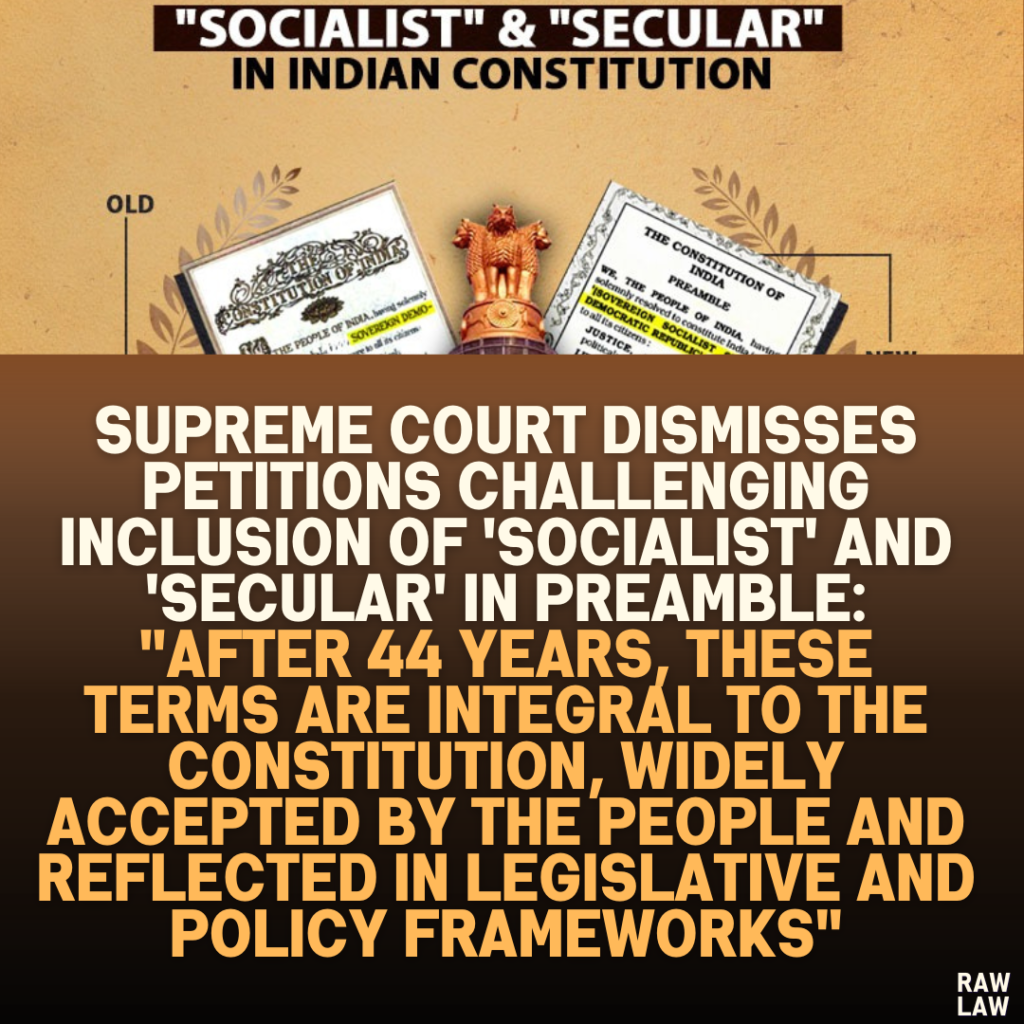Court’s Decision:
The Supreme Court dismissed the writ petitions challenging the inclusion of “socialist” and “secular” in the Preamble of the Constitution through the Forty-second Amendment Act, 1976. The Court affirmed that Parliament possesses the authority under Article 368 of the Constitution to amend the Preamble. It emphasized that the Constitution is a “living document” meant to evolve with the aspirations of the people while safeguarding its basic structure.
Facts:
- The petitions were filed in 2020, over four decades after the amendments were made in 1976.
- The petitioners contended that:
- The terms “socialist” and “secular” were consciously excluded by the Constituent Assembly when the Constitution was adopted in 1949.
- Their inclusion retrospectively distorted the original spirit of the Constitution.
- The Forty-second Amendment was enacted during the Emergency, a time when the Lok Sabha had exceeded its normal tenure, which allegedly undermined the democratic will of the people.
- The inclusion of “socialist” and “secular” in the Preamble was also argued to restrict economic policies and religious freedoms, contrary to the democratic ethos of the nation.
Issues:
- Constitutionality: Does the inclusion of “socialist” and “secular” in the Preamble violate the basic structure of the Constitution?
- Legitimacy: Was the Forty-second Amendment validly enacted during the Emergency and extended tenure of the Lok Sabha?
- Impact: Do these terms restrict the scope of economic policies and infringe upon religious freedom?
Petitioner’s Arguments:
- Historical Context: The petitioners argued that the Constituent Assembly, after deliberate consideration, chose not to include “socialist” and “secular” in the Preamble.
- Retrospectivity: They contended that the retrospective insertion of these terms distorted the constitutional document adopted in 1949.
- Emergency Legitimacy: The amendment was passed during an Emergency and an extended Lok Sabha tenure, undermining democratic principles.
- Policy Restriction: They claimed that:
- “Socialist” unduly fetters economic policies by mandating state intervention in the economy.
- “Secular” was vague in 1976 and lacked a clear definition, leading to potential misapplication.
Respondent’s Arguments:
- Parliamentary Authority: The respondents argued that Article 368 grants Parliament the authority to amend any part of the Constitution, including the Preamble, as long as the amendment does not violate its basic structure.
- Constitutional Evolution: They asserted that the inclusion of “socialist” and “secular” reflects the evolving aspirations of the nation and aligns with the Constitution’s values.
- No Restriction: The terms do not restrict economic or religious freedoms but instead reinforce the goals of equality, liberty, and justice.
Analysis of the Law:
- Amending Power: Article 368 explicitly empowers Parliament to amend the Constitution. This includes amendments to the Preamble, as affirmed by judicial precedents.
- Basic Structure Doctrine: The Court reiterated that amendments are valid unless they alter the Constitution’s basic structure. The terms “socialist” and “secular” were found to reinforce rather than dilute the foundational values of the Constitution.
Precedent Analysis:
- Kesavananda Bharati v. State of Kerala (1973):
- Defined the doctrine of basic structure, restricting Parliament’s power to amend the Constitution beyond its core principles.
- S.R. Bommai v. Union of India (1994):
- Held secularism as a basic feature of the Constitution, ensuring equal treatment of all religions by the State.
- R.C. Poudyal v. Union of India (1994):
- Explained that secularism in India ensures equal respect for all faiths, even though it was not explicitly mentioned in the original Constitution.
- M. Ismail Faruqui v. Union of India (1994):
- Described Indian secularism as the widest possible interpretation of equality among all religions.
- Excel Wear v. Union of India (1978):
- Clarified that “socialist” in the Preamble does not mandate state ownership of resources but reflects a welfare-oriented economic approach.
Court’s Reasoning:
- Living Document: The Court emphasized that the Constitution is dynamic, capable of adapting to societal changes and emerging needs. It held:
- “Secularism” ensures equal respect for all religions and aligns with Articles 14, 15, 16, 25, and 26 of the Constitution.
- “Socialism” embodies the State’s commitment to economic and social justice, fostering equality of opportunity while allowing private enterprise to thrive under Article 19(1)(g).
- Democratic Mandate: The Court clarified that the amendments were enacted by a legitimate Parliament and subsequently scrutinized by elected representatives in later years.
- Time Factor: The Court highlighted that after 44 years, the terms “socialist” and “secular” have become integral to the Constitution, widely accepted by the people and reflected in legislative and policy frameworks.
Conclusion:
The Supreme Court concluded that the challenge to the Forty-second Amendment was devoid of merit. It dismissed the petitions, stating that the inclusion of “socialist” and “secular” aligns with the Constitution’s evolving ethos and does not infringe upon its basic structure.
Implications:
- Reinforcement of Parliamentary Authority: The judgment underscores the broad scope of Parliament’s amending power under Article 368.
- Dynamic Constitution: It reiterates that the Constitution is a living document, capable of evolving with societal needs while preserving its fundamental structure.
- Welfare and Equality: The judgment highlights the Indian interpretation of secularism and socialism as principles fostering inclusion, equality, and social justice.
This judgment reaffirms the adaptability of the Constitution and the enduring relevance of its foundational principles.
